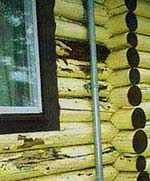With Painted Logs
 This log house was originally coated with house paint instead of a Log Home Finish.
You can see where the house logs have cracked or "checked" leaving open
cracks in the paint for rain water to penetrate into the wood causing
further log rot. The density of the paint coating acts like a plastic
sheeting that traps in moisture causing blisters and flaking paint. In
winter when the logs freeze, the trapped moisture expands by becoming
ice particles. This causes more subsurface damage making tiny cracks
larger and allowing more space for water to penetrate farther into the
log causing more damage. In the photograph, the dark area behind the
pipe is totally rotted.
This log house was originally coated with house paint instead of a Log Home Finish.
You can see where the house logs have cracked or "checked" leaving open
cracks in the paint for rain water to penetrate into the wood causing
further log rot. The density of the paint coating acts like a plastic
sheeting that traps in moisture causing blisters and flaking paint. In
winter when the logs freeze, the trapped moisture expands by becoming
ice particles. This causes more subsurface damage making tiny cracks
larger and allowing more space for water to penetrate farther into the
log causing more damage. In the photograph, the dark area behind the
pipe is totally rotted.
In a situation like this all of the paint needs to be
removed with either a chemical stripper or blasted with media (glass is most common now). The
next step would be to cut out the rotted areas of wood and use Tim-bor or Boracol to saturate the logs and keep them from rotting any further. If the rotted areas are relatively shallow, LiquidWood can be used to seal cracks and create an undercoating for the WoodEpox
to adhere to. Next, apply the WoodEpox and form it so that it conforms
to the rest of the log. Dry pigment can be added to WoodEpox to color it
(especially if you will be coating with a stain). Allow to dry
thoroughly, then apply a new finish.
If large portions of the logs are rotted away, you will
either have to replace portions of the log with half-log inserts or
replace the entire log. You may need the services of a professional log
home restoration contractor.
Questions on maintaining the legacy of your wood structure? Give us a call- 1-800-359-6614

No comments:
Post a Comment